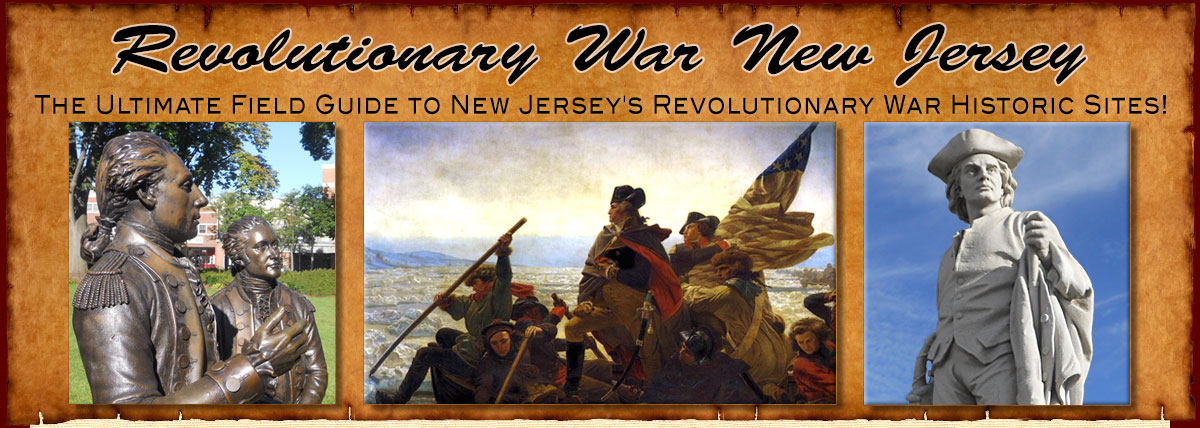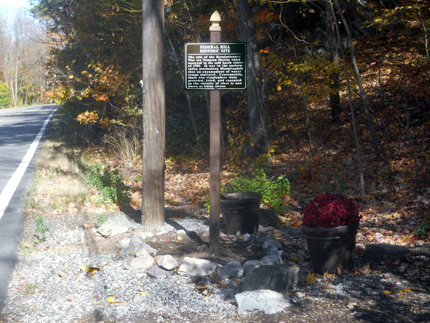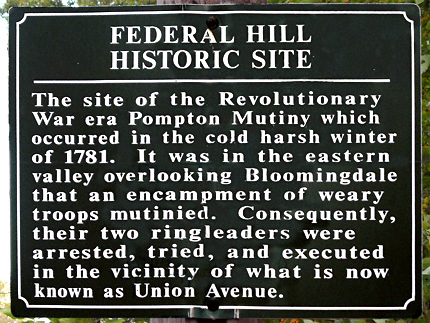



Federal Hill Historic Site
Site of Pompton Mutiny
State Rte. 511 / Union Ave. (Between Van Dam Ave. and Morse Lake Rd.)
Map / Directions to the site of the Pompton Mutiny
Prelude:
The Pennsylvania Line Mutiny, which occurred at Morristown January 1, 1781,
Nineteen Days Before the Pompton Mutiny [1]
In the Revolutionary War era, armies did not generally fight in the winter, and would take up winter quarters. In the winter of 1780-1781, General George Washington headquartered at New Windsor, NY, while the Continental (American) Army was spread out in small encampments which stretched along the roughly sixty miles from West Point, NY, to Morristown.
As winter 1780 approached, tensions were running high among the Continental Army troops. They were angry about the lack of sufficient food, clothing, and pay. When they enlisted, the soldiers had been promised that a new set of clothes and a blanket would be issued to them every year. Instead, the realities of supplying the army through the difficult war years had meant that these annual new clothes and blankets had not been issued. As winter weather set in, the lack of these necessities took on a greater urgency.
General Anthony Wayne, who was in command of about 2,500 Pennsylvania troops that were encamped near Morristown, was well aware of the situation among his men, which he described in a letter to Pennsylvania Governor Joseph Reed on December 16: " the old worn out coats and tattered linen overalls, and what was once a poor substitute for a blanket, (now divided among three soldiers,) is but very wretched living and shelter against the winter's piercing cold drifting snows, and chilling sleets. Our soldiery are not devoid of reasoning faculties, nor are they callous to the first feelings of nature; they have now served their country with fidelity for near five years, poorly clothed, badly fed, and worse paid; of the last article, trifling as it is, they have not seen a paper dollar in the way of pay for near twelve months." [2]
The situation came to a head when about 1300 of the troops at Morristown mutinied on New Year's Day 1781. Several officers were killed or wounded. The mutineers set out on a march towards Philadelphia, where they intended to demand that Congress take steps to relieve their situation. General Anthony Wayne and two of his officers followed the mutineers, who never made it to Philadelphia. They reached Princeton on January 3. Joseph Reed arrived in Princeton the next day, and negotiations were conducted until a settlement was reached on January 8.
The Pompton Mutiny - January 20, 1781
The same winter, there were New Jersey troops encamped in the area known as Pompton, which made up the area of modern-day Bloomingdale, Riverdale and Pompton Lakes. On January 20, about 200-300 of the soldiers at Pompton mutinied. They were likely emboldened by the concessions achieved by the Pennsylvania Line Mutiny. According to eyewitness accounts, they were also quite drunk. Unlike the Pennsylvania Line Mutiny, no blood was spilled. They set out for the state capital at Trenton, where they intended to make demands. Their march would take them through Chatham, where another army camp was located, and they hoped to recruit more mutineers from among the troops there. [3]
While the first mutiny had been dealt with leniently, General George Washington decided that this second mutiny needed to be handled decisively, or the mutinies could become a pattern which could spread throughout the Continental Army. This time, there were to be no negotiations, and the mutiny was to be put down strongly to discourage other troops from mutiny. On January 22, he ordered Major General Robert Howe to march with about five-hundred troops from West Point to Pompton to quell the mutiny. Washington's orders to Howe made clear the seriousness of the situation: [4]
"You are to take the command of the detachment, which has been ordered to march from this post against the mutineers of the Jersey line. You will rendezvous the whole of your command at Ringwood or Pompton, as you may find best from circumstances. The object of your detachment is to compel the mutineers to unconditional submission; and I am to desire, that you will grant no terms while they are with arms in their hands in a state of resistance. The manner of executing this I leave to your discretion. If you succeed in compelling the revolted troops to a surrender, you will instantly execute a few of the most active and incendiary leaders."
When the mutineers reached Chatham on January 24, they found that none of the troops there were willing to join the mutiny. They were convinced to march back to Pompton. [5]
Washington rode down from his current headquarters in New Windsor, New York, to be closer to the situation. He arrived at nearby Ringwood on January 26 or 27. However, he thought it best not to involve himself directly in quelling the mutiny, and left General Robert Howe in charge of the situation. [6]
General Robert Howe and his troops arrived at Pompton on January 27. With the fate of the Continental Army on the line, Howe treated these mutineers with a firmness not seen with the Pennsylvania troops mutiny. Three of the mutiny's leaders were selected to be executed on the spot by a firing squad made up of other mutineers. The following eyewitness account of the grim scene was made by Dr James Thatcher, a Continental Army doctor who was with Howe's troops: [7]
"Marched on the 27th, at one o'clock A. M. eight miles, which brought us in view of the huts of the insurgent soldiers by dawn of day. Here we halted for an hour, to make the necessary preparations. Some of our officers suffered much anxiety, lest the soldiers would not prove faithful on this trying occasion. Orders were given to load their arms: it was obeyed with alacrity and indications were given that they were to be relied on.
"Being paraded in a line, General Howe harangued them, representing the heinousness of the crime of mutiny, and the absolute necessity of military subordination; adding that the mutineers must be brought to an unconditional submission: no temporizing, no listening to terms of compromise, while in a state of resistance. Two field-pieces were now ordered to be placed in view of the insurgents, and the troops were directed to surround the huts on all sides.
"General Howe next ordered his aid-de-camp to command the mutineers to appear on parade in front of their huts unarmed, within five minutes; observing them to hesitate, a second messenger was sent, and they instantly obeyed the command, and paraded in a line without arms, being in number between two and three hundred. Finding themselves closely encircled and unable to resist, they quietly submitted to the fate which awaited them. General Howe ordered that three of the ringleaders should be selected as victims for condign punishment. These unfortunate culprits were tried on the spot, Colonel Sprout being president of the court-martial, standing on the snow, and they were sentenced to be immediately shot.
"Twelve of the most guilty mutineers were next selected to be their executioners. This was a most painful task; being themselves guilty, they were greatly distressed with the duty imposed on them, and when ordered to load, some of them shed tears. The wretched victims, overwhelmed by the terrors of death, had neither time nor power to implore the mercy and forgiveness of their God, and such was their agonizing condition, that no heart could refrain from emotions of sympathy and compassion.
"The first that suffered was a sergeant, and an old offender; he was led a few yards' distance, and placed on his knees; six of the executioners, at the signal given by an officer, fired, three aiming at the head and three at the breast, the other six reserving their fire in order to despatch the victim, should the first fire fail; it so happened in this instance; the remaining six then fired, and life was instantly extinguished. The second criminal was, by the first fire, sent into eternity in an instant. The third being less criminal, by the recommendation of his officers, to his unspeakable joy, received a pardon.
"This tragical scene produced a dreadful shock, and a salutary effect on the minds of the guilty soldiers. Never were men more completely humbled and penitent; tears of sorrow and of joy rushed from their eyes, and each one appeared to congratulate himself that his forfeited life had been spared. The executions being finished, General Howe ordered the former officers to take their stations, and resume their respective commands; he then, in a very pathetic and affecting manner, addressed the whole line by platoons, endeavoring to impress their minds with a sense of the enormity of their crime, and the dreadful consequences that might have resulted. He then commanded them to ask pardon of their officers, and promise to devote themselves to the faithful discharge of their duty as soldiers in future. It is most painful to reflect, that circumstances should imperiously demand the infliction of capital punishment on soldiers who have more than a shadow of plea to extenuate their crime. These unfortunate men have long suffered many serious grievances, which they have sustained with commendable patience; but have at length lost their confidence in public justice.
"The success of the Pennsylvania insurgents undoubtedly encouraged them to hope for exemption from punishment. But the very existence of an army depends on proper discipline and subordination. The arm of authority must be exerted, and public examples be exhibited, to deter from the commission of crimes. The spirit of revolt must be effectually repressed, or a total annihilation of the army is inevitable."
Although Washington had seen it as necessary to deal decisively with the Pompton Mutiny to avoid a breakdown of the entire army, he also recognized the truth of their grievances regarding food, clothing, and pay. And so after the suppression of the mutiny, Washington supported the recognition of their grievances. He wrote in a letter to a committee charged with addressing the grievances of the mutineers that "having punished guilt and supported authority—it now becomes proper to do justice." [8]
There is uncertainty about the exact location of the Pompton camp and mutiny, other than it was somewhere in the Pompton area. The sign commemorating the Pompton Mutiny pictured above is located on the Union Avenue side of Federal Hill in Bloomingdale. There is a small paved area where you can park to view the sign.

1. ^ For a fuller description of the Pennsylvania Line Mutiny, along with information about the house used by General Wayne used as his headquarters, see the Site Of Peter Kemble House - "Mount Kemble" entry on the Harding Township page.
2. ^ Anthony Wayne letter to Joseph Reed, December 16, 1780, reprinted in:
William B. Reed, Life and Correspondence of Joseph Reed: Military Secretary of Washington, at Cambridge, Adjutant-general of the Continental Army, Member of the Congress of the United States, and President of the Executive Council of the State of Pennsylvania, Volume 2 (Philadelphia: Lindsay and Blakiston, 1847) Pages 315 - 317
Available to be read at Google Books here
▸ Reed's official title was President of the Supreme Executive Council of Pennsylvania, which is the equivalent of governor.
3. ^ Two eyewitness accounts exist of this night, which were sent to General Washington from two of the officers on the scene.
“Colonel Israel Shreve to George Washington, 20 January 1781,” Founders Online, National Archives, https://founders.archives.gov/documents/Washington/03-30-02-0192. [Original source: The Papers of George Washington, Revolutionary War Series, vol. 30, 1 January–6 March 1781, ed. Benjamin L. Huggins. Charlottesville: University of Virginia Press, 2022, pp. 222–223.]
“Frederick Frelinghuysen to George Washington, 20 January 1781,” Founders Online, National Archives, https://founders.archives.gov/documents/Washington/03-30-02-0184. [Original source: The Papers of George Washington, Revolutionary War Series, vol. 30, 1 January–6 March 1781, ed. Benjamin L. Huggins. Charlottesville: University of Virginia Press, 2022, pp. 212–213.]
Both mention the drunkenness of the mutineers.
Shreve wrote, "Most of them are much disguised with liquor."
Frelinghuysen wrote, "they were so much heated with the Liquor procured With the Money now paid to them."Another officer at Pompton, William De Hart, who did not witness the mutiny personally, also wrote to Washington to inform him:
“Lieutenant Colonel William De Hart to George Washington, 21 January 1781,” Founders Online, National Archives, https://founders.archives.gov/documents/Washington/03-30-02-0198. [Original source: The Papers of George Washington, Revolutionary War Series, vol. 30, 1 January–6 March 1781, ed. Benjamin L. Huggins. Charlottesville: University of Virginia Press, 2022, p. 228.]
4. ^ George Washington letter to Major General Robert Howe, Jan 22, 1781
George Washington; Edited by Jared Sparks, The Writings of George Washington Volume 7 (Boston: Russell, Odiorne, and Metcalf; and Hilliard Gray and Co. 1835) p. 380-381
Available to be read at Google Books here• Other letters written by Washington that express his concern with the situation include:
“George Washington to Colonel Israel Shreve, 21 January 1781,” Founders Online, National Archives, https://founders.archives.gov/documents/Washington/03-30-02-0202. [Original source: The Papers of George Washington, Revolutionary War Series, vol. 30, 1 January–6 March 1781, ed. Benjamin L. Huggins. Charlottesville: University of Virginia Press, 2022, p. 231.]
“Circular to the States, 22 January 1781,” Founders Online, National Archives, https://founders.archives.gov/documents/Washington/03-30-02-0206. [Original source: The Papers of George Washington, Revolutionary War Series, vol. 30, 1 January–6 March 1781, ed. Benjamin L. Huggins. Charlottesville: University of Virginia Press, 2022, pp. 234–235.]
George Washington letter to President of Congress, Jan 23, 1781
Quoted from "The writings of George Washington from the original manuscript sources, 1745-1799; prepared under the direction of the United States George Washington Bicentennial Commission and published by authority of Congress," which was digitized by the Internet Archive in 2010. Digitized version is available online here“George Washington to Samuel Huntington, 23 January 1781,” Founders Online, National Archives, https://founders.archives.gov/documents/Washington/03-30-02-0214. [Original source: The Papers of George Washington, Revolutionary War Series, vol. 30, 1 January–6 March 1781, ed. Benjamin L. Huggins. Charlottesville: University of Virginia Press, 2022, pp. 243–244.]
“George Washington to Comte de Rochambeau, 24 January 1781,” Founders Online, National Archives, https://founders.archives.gov/documents/Hamilton/01-02-02-1036. [Original source: The Papers of Alexander Hamilton, vol. 2, 1779–1781, ed. Harold C. Syrett. New York: Columbia University Press, 1961, p. 542.]
5. ^ “Colonel Elias Dayton to George Washington, 24 January 1781,” Founders Online, National Archives, https://founders.archives.gov/documents/Washington/03-30-02-0220. [Original source: The Papers of George Washington, Revolutionary War Series, vol. 30, 1 January–6 March 1781, ed. Benjamin L. Huggins. Charlottesville: University of Virginia Press, 2022, pp. 249–251.]
6. ^ On January 25, 1781, Washington wrote to Howe, "I have not heard a word of the Jersey Troops, since the first intelligence of their defection—And am extremely anxious to know the true state of Matters—for this purpose, I shall set out tomorrow towards you; but Not with a design of superseding Your command."
The letter can be read at:
“George Washington to Major General Robert Howe, 25 January 1781,” Founders Online, National Archives, https://founders.archives.gov/documents/Washington/03-30-02-0234. [Original source: The Papers of George Washington, Revolutionary War Series, vol. 30, 1 January–6 March 1781, ed. Benjamin L. Huggins. Charlottesville: University of Virginia Press, 2022, pp. 267–268.]• Washington's letters up until January 25 are marked as being from New Windsor. Beginning on January 27, they are marked Ringwood, so Washington was likely traveling the thirty miles from New Windsor to Ringwood on the 26th, arriving that day or early on the 27th.
7. ^ James Thacher, Military Journal of the American Revolution, from the Commencement to the Disbanding of the American Army (Hartford, Connecticut: Hurlbut, Williams & Company, 1862) Pages 251 - 253
Available to be read at Google Books here
▸ NOTE that in the original text, this entire account is shown as one long paragraph. In order to make the account more readable, it has been broken up into paragraphs in the above entry.8. ^“George Washington to the Commissioners for Redressing the Grievances of the New Jersey Line, 27 January 1781,” Founders Online, National Archives, https://founders.archives.gov/documents/Washington/03-30-02-0247. [Original source: The Papers of George Washington, Revolutionary War Series, vol. 30, 1 January–6 March 1781, ed. Benjamin L. Huggins. Charlottesville: University of Virginia Press, 2022, pp. 277–278.]
“George Washington to the Officer Commanding the New Jersey Line, 27 January 1781,” Founders Online, National Archives, https://founders.archives.gov/documents/Hamilton/01-02-02-1043. [Original source: The Papers of Alexander Hamilton, vol. 2, 1779–1781, ed. Harold C. Syrett. New York: Columbia University Press, 1961, p. 545.]
The following letters also deal with the aftermath of the Pompton Mutiny:
“George Washington to William Livingston, 27 January 1781,” Founders Online, National Archives, https://founders.archives.gov/documents/Washington/03-30-02-0250. [Original source: The Papers of George Washington, Revolutionary War Series, vol. 30, 1 January–6 March 1781, ed. Benjamin L. Huggins. Charlottesville: University of Virginia Press, 2022, pp. 283–284.]
▸ Note that William Livingston was serving as the Governor of New Jersey at this time.
“George Washington to Brigadier General Anthony Wayne, 27 January 1781,” Founders Online, National Archives, https://founders.archives.gov/documents/Washington/03-30-02-0253. [Original source: The Papers of George Washington, Revolutionary War Series, vol. 30, 1 January–6 March 1781, ed. Benjamin L. Huggins. Charlottesville: University of Virginia Press, 2022, pp. 285–286.]
“George Washington to Colonel Israel Shreve, 28 January 1781,” Founders Online, National Archives, https://founders.archives.gov/documents/Washington/03-30-02-0259. [Original source: The Papers of George Washington, Revolutionary War Series, vol. 30, 1 January–6 March 1781, ed. Benjamin L. Huggins. Charlottesville: University of Virginia Press, 2022, p. 295.]
“Colonel Israel Shreve to George Washington, 28 January 1781,” Founders Online, National Archives, https://founders.archives.gov/documents/Washington/03-30-02-0260. [Original source: The Papers of George Washington, Revolutionary War Series, vol. 30, 1 January–6 March 1781, ed. Benjamin L. Huggins. Charlottesville: University of Virginia Press, 2022, pp. 295–296.]